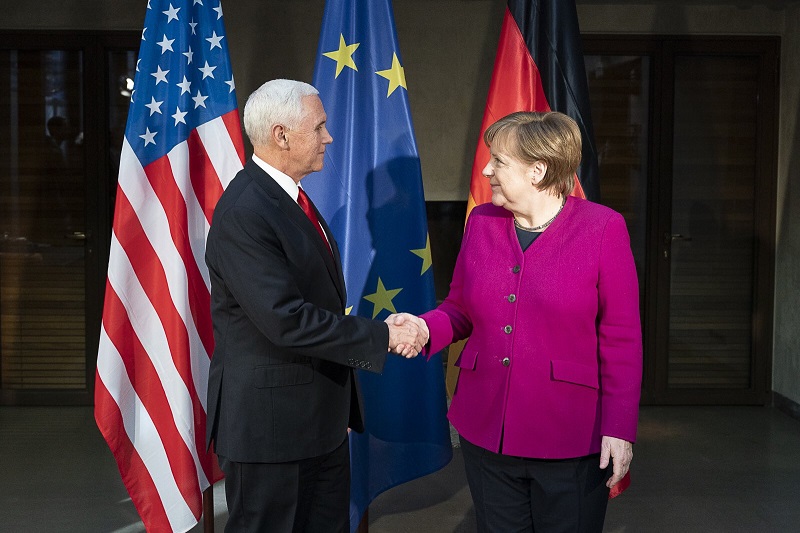Showdown in Munich

It was at the 2007 Munich Security Conference that Russian President Vladimir Putin first signalled a cooling of Russian–Western relations. Soon thereafter, Russia invaded Georgia; and in the years since, it has annexed Crimea, launched incursions into Eastern Ukraine, and carried out cyberattacks against Western democracies. Today, Russian–Western relations are in a downward spiral.
The annual Munich Security Conference is to geopolitics what the World Economic Forum’s meetings in Davos are to business. The gathering has evolved from its Cold War–era focus primarily on German–American military cooperation to viewing global issues through a much wider lens. Participants now discuss topics ranging from foreign policy and international security to climate change.
This year’s three-day conference, which had record-high attendance, will most likely be remembered for years to come. The speeches delivered by US Vice President Mike Pence and German Chancellor Angela Merkel could not have been more different, in terms of both style and substance. At a gathering originally designed to facilitate German–American cooperation, Germany’s and America’s foreign-policy positions have rarely been so far apart.
Pence delivered a hardline ‘America first’ message and celebrated the Trump administration’s adamant refusal to accept longstanding rules and international agreements. Europeans, he declared, have no choice but to follow America’s lead, even—indeed, especially—if it means renouncing the 2015 Iran nuclear agreement that European diplomats did so much to bring about. As with his previous appearance at the conference, Pence refused to take any questions after his speech. Many of his ‘applause lines’ were met with stony silence.
Prior to Pence’s appearance, Merkel had delivered a speech that might well go down as one of the best of her career. With energy and aplomb, she mounted a vigorous defence of multilateral efforts to confront climate change, Russian aggression, development in Africa and a range of other challenges that lie ahead. The overall thrust of Merkel’s remarks was obvious to everyone. She delivered a pointed rebuke of ‘America first’ unilateralism.
Merkel’s speech received a standing ovation, which is unusual for the Munich Security Conference. She also took questions, which she answered with confidence and a hint of humour, winning herself another standing ovation.
Like Putin’s aggressive remarks in 2007, Pence’s and Merkel’s speeches will be remembered for what they augur for the future. Taken together, they confirm that Donald Trump’s presidency has ushered in a period of escalating transatlantic tensions that show no signs of abating. It was only a year ago that Europeans were told to ignore Trump’s tweets and focus on the substance of US policies, which were being overseen by the ‘adults in the room’. But with the departure of Secretary of Defense Jim Mattis and others, the adults are now gone, and there is ever-less daylight between the policies and the tweets.
Nowhere is the disconnect between US and European priorities more obvious than in the Middle East. When Pence browbeats European countries to abandon their efforts to save the 2015 Joint Comprehensive Plan of Action—which imposes clear, verifiable restrictions on Iran’s nuclear program—one can only wonder about the Trump administration’s endgame. If and when Iran restarts its nuclear-weapons program, US–Iranian tensions will almost certainly escalate to the point of crisis. The question is whether that is the outcome Trump and his advisers have sought all along.
The tensions on trade issues are also acute. The Trump administration has already designated European steel and aluminium exports a threat to US national security, and now it may be preparing to add European cars to that list. If it does, the transatlantic trade conflict will enter dangerous territory.
Trump seems to have a particular aversion to German cars, which account for only 8% of US auto sales (though they do command a much greater share of the luxury/premium market). Moreover, as Merkel pointed out in her speech, the world’s largest BMW plant is not in Germany, but in South Carolina, where a substantial share of production is exported to China. By pursuing dramatically higher auto tariffs, the Trump administration is threatening jobs not only in Europe, but also in the US; both would suffer from a disruption to global value chains.
A year from now, many of the same leaders and policymakers will gather in Munich once again. If the worst-case scenario suggested by this year’s gathering comes to pass, we might be heading for open war in the Middle East and a devastating trade war across the Atlantic.
Or perhaps this year’s conference will have set off the alarm bells needed to prevent the worst from happening. The transatlantic relationship is complicated enough as it is. No one should place it at risk of unraveling further.